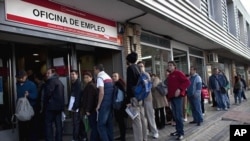With southern Europe struggling under public debt, inflation and scant growth, Spain has broken a European record for unemployment. More than one in five Spaniards are out of work, posing a threat to quick recovery for southern Europe's biggest economy, and the region as a whole.
Mre than one in five working-age Spaniards are unemployed - more than in any other country in Europe. Spain's jobless rate has hit a 15-year high, nearly double the figure in neighboring Portugal.
But many Spaniards do not believe that number is accurate. Retiree Luis Cases says that in his hometown of Valencia, it feels like 95 percent of people are out of work.
"The people I know, it's 95 percent, no work," he said. "It's a bad situation for young people - and old men."
Cases describes what he thinks of the official jobless rate of 21.3 percent.
"No, rubbish! The government says rubbish! No, no, it's more, more, more," he said. "It's very, very difficult. There's no money. The young want to get married, have children and house. But where is the money?"
Spain is southern Europe's economic engine, and is in better shape to survive the global economic crisis than its neighbors. Ailing Portugal and Greece have asked for European bailouts, along with Ireland. But those countries have far fewer people out of work, raising the question of whether Spain's jobless rate is accurate, and what role unemployment actually plays in a country's economic well-being.
Aroa Lopez, from Madrid, says she thinks the Spanish government figure is too high, because many Spaniards collect unemployment benefits but still work at restaurants or other jobs where they are paid in cash.
"So many people take this money," she said. "It's difficult, because the government, when you don't have a job, pay you around two or three years. The government pays you, and it's very easy. So many people take the government money and have another job."
Vanessa Rossi, an economist at London's Chatham House think tank, acknowledges that the way governments calculate unemployment data could be problematic. While Portugal and Greece tend to under-report their jobless numbers, Spain may be doing just the opposite.
"The Spanish unemployment rate might actually be slightly lower than these figures," she said. "That's quite in contrast to many other countries that have the opposite problem - they under-report unemployment."
The Greek jobless rate is 15 percent - still a national record. Portugal's is around 11 percent. That is nearly half the rate in Spain, but unemployment has still hit Greece and Portugal harder. Rossi says it is because in Spain, high unemployment has long been a fact of life, even when the economy is booming. She says the remarkable thing is how low Spain's unemployment got a few years ago, during a huge construction boom - not how high it is now.
"In a sense, Spain's reverted to its previous model. It's not that it's unusual compared to its history, it's actually quite usual," she said. "And it's all the usual problems that were there before that property splurge."
The question is why Spain's unemployment has always been high, compared to the rest of southern Europe. Rossi offers one theory.
"It seems to be partly a structural issue in the way the employment laws operate," she said. "There's a reluctance to give people full employment. There are relatively few fixed jobs with full employment security."
She says Greece and Portugal have slightly different labor laws that do not end up exacerbating unemployment. But Rossi says Spain is still in better financial shape overall.
"In relation to the economy, I think it [Spain] could start to look a little livelier, and it need not go into the crisis that we've seen in Portugal, because the finances are a bit better," he said. "But that doesn't mean that you can get away from this unemployment problem that's been so persistent."
That persistent problem is on the minds of recent college graduates like Laura Lopez, who studied to be a teacher but now can't find a job.
"Last year, I finished my degree, but I couldn't find a job," she said. "So I have to define my life in other things."
Lopez says she and her friends are all under-employed, working in restaurants or part-time, even though they have university degrees. Such stories are common across southern Europe. And none of them is counted in official unemployment figures.
Spain Sets Europe's Unemployment Record, But Remains Economic Engine




